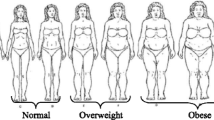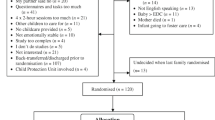Abstract
This pilot intervention study assesses the impact of demonstrating two different physical exams (Brazelton Behavioral Assessment Scale vs. standard physical exam) of ill preterm infants to their mothers at 34 weeks gestational age. Outcome measures include mothers' (newborn intensive care unit) N.I.C.U. visits one week subsequently, and, at six months corrected age, mothers' attitudes towards childrearing, mother's assessment of infant temperament, mothers' memory of the examination and infants' development quotient. In addition, we compare the overall group of pre-term mothers' childrearing attitudes to full-term mothers. We found differences in childrearing attitudes between full-term and pre-term mothers and between intervention and control pre-term mothers. We also found that the intervention Brazelton Newborn Behavioral Assessment Scale (BNBAS) facilitated mothers' visits to the N.I.C.U. and at six months, mothers' attitudes towards reciprocity and their tendency to perceive their infants temperamently easier.
Similar content being viewed by others
References
Nurcombe B, et al.: An intervention program for mothers of low-birthweight infants: Preliminary results:J Amer. Acad. Child Psych. 23:319–325, 1984.
Minde K, Whitelow A, Brown J, et al.: The effect of neonatal complication with premature infants or early parent-infant interaction.Dev. Med. & Child Neurol. 25:763–775, 1983.
Cohler B, Weiss J, Grunebaum H: Child-care attitudes and emotional disturbances among mothers of young children.Genetic Psychol. Monographs. 82:3–47, 1970.
Als H: Infant Individuality:Assessing Patterns of Very Early Development. New York: Basic Books, 1981.
Als H, Lester BM, Brazelton TB: Dynamics of the behavioral organization of the premature infant In:Infants, eds. Field TM, Sostek AM, Goldberg S, Shuman HH New York: Spectrum, 1979.
Harmon RJ and Culp AM: The effects of premature birth on family functioning and infant development. In: Children and our Future., ed., Berlin J Albuquerque: U of New Mexico Press, 1981.
Bakeman K, and Brown J: Mother-infant interaction during the first months of life: Differences between preterm and fullterm infant-mother dyads from a low income population. Technical Reports #5 for Grant #MH26131, 1977.
Field TM: Interaction pattern of preterm and term infants, In:Infants Born at Risk., ed. Field TM. Jamaica, NY: Spectrum Pub., 1979.
Als H: Discussion of an intervention program for mothers of low birthweight babies: Outcome at six and twelve months. In:Frontiers of Infant Psychiatry., Call J, Galenson E, Tyson R New York: Basic Books, 1984.
Widmayer S, Fields T: Effects of Brazelton demonstrations for mothers on the development pattern of preterm infants.Pediatrics. 67:711–714, 1981.
Brazelton TB:Neonatal Behavioral Assessment Scale. Philadelphia: JB Lippincott, 1973
Anderson C: Enhancing reciprocity between mother and neonate.Nursing Research. 30:89–93, 1981.
Furr P, Kirgis C: Per Nugent K, personal communication, 1981.
McLaughlin FJ: The effect of the mother's observation of a neonatal assessment and subsequent mother-infant interaction.Dissertation Abstracts International. 41, 1980.
Worobey J, Belsky J: Employing the Brazelton scale to influence mothering: An experimental comparison of 3 strategies.Development Psychology. 18:736–743, 1982.
Myers B: Early interaction using Brazelton training with middle-class mothers and fathers of newborns.Child Development. 53:462–471, 1982.
Niebuhr V: The effectivenes of providing parents with feedback on the behavioral responses of their newborn using information from Brazelton's neonatal behavioral assessment scale.Dissertation Abstracts International. 40 (8-B), 1980.
Olsen R, Olsen G, Pernice J, et al.: The use of the BNBAS as an intervention with high risk mothers in the newborn period. Ambulatory Pediatric Association and Society for Pediatric Research Meeting, San Francisco, April 1981.
Eyler, FD: The assessment and intervention with mothers and their premature newborns. Presented at International Conference on Infant Studies, New Haven, CT, March 1980.
Dolby R, English B, Warren, B.: Brazelton demonstrations for mothers and fathers: Impact on the developing parent-infant relationship. Presented at International Conference on Infant Studies, Austin, TX, March 1982.
Berger L: Newborns are people too: An abbreviated Brazelton assessment for clinical use.Development and Behavioral Pediatrics. 2:109–111, 1981.
Boyd S: Mothers's and fathers' attitudes towards involvement in infant caretaking: Implications for family nursing research.Dissertation Abstracts International, 1981.
Applebaum A: Neonatal assessment scale to encourage the bonding of parents to their newborn babies.Psychoanalytic Inquiry. 1:4, 1982.
Dubowitz L, Dubowitz V, Goldberg C: Clinical assessment of gestational age in the newborn infant.Journal of Pediatrics. 77:1, 1970.
Hollingshead, AB: Two Factor Index of Social Position. In:A Decade Later: A Followup of Social Class and Mental Illness., eds. Myers, Bean. New York: John Wiley & Sons, 1968.
Cohler B: Maternal attitude scale, in tests and measurements. In:Child Development Handbook II, Vol. 2. San Francisco: Jossey-Bass, 1976.
Carey W, McDevitt S: Infant temperament questionnaire.Pediatrics. 61:735–739, 1978.
Bayley N:Bayley Scales of Infant Development. New York: The Psychological Corporation, 1969.
Cohen S, Beckwith L: Preterm infant's interaction with a caregiver in the 1st year of life and competence at age 2.Child Development. 50:767–776, 1979.
DeVries MW, Sameroff, A. Culture and temperament: Influence on infant temperament in three East African societies.American Journal of Orthopsychiatry. 54:83–96, 1984.
Author information
Authors and Affiliations
Rights and permissions
About this article
Cite this article
Szajnberg, N., Ward, M.J., Krauss, A. et al. Low birth-weight prematures: Preventive intervention and maternal attitude. Child Psych Hum Dev 17, 152–165 (1987). https://doi.org/10.1007/BF00706226
Received:
Revised:
Accepted:
Issue Date:
DOI: https://doi.org/10.1007/BF00706226




